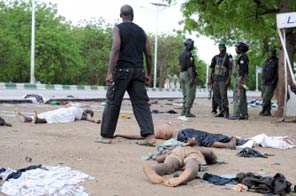Nigeria shells sect leader's home
MAIDUGURI: Nigerian forces Tuesday shelled the home of the leader of an Islamic fundamentalist sect on the third day of fierce clashes that have left more than 250 people dead, witnesses said.
An AFP reporter heard sporadic mortar fire and gunshots as soldiers shelled the home of Mohammed Yusuf in Maiduguri, sending plumes of smoke rising over the capital of northern Borno state.
"The deafening sounds are from mortar shelling of the house of the leader of the Taliban by the military, who are also tackling pockets of the trouble makers in gunbattles," a source at the police headquarters told AFP.
The shelling came as Nigerian security forces sought to end an uprising by the self-styled Nigerian "Taliban" which has targetted police in four northern states since early Sunday.
President Umaru Yar'Adua, speaking in the capital Abuja, said the situation in northern Nigeria was "under control" and indicated that a final assault was underway.
"We have the situation under control now and I believe that by the end of the day, everything would have been taken care of," Yar'Adua told reporters as he boarded a flight at Abuja airport for Brazil.
The military operation under way would "contain them once and for all," he added.
"They will be dealt with squarely and forthwith."
The home of elusive sect leader Yusuf and a nearby mosque used by his followers were overrun by security forces during the assault, the AFP reporter said.
The fighting had begun Sunday in neighbouring Bauchi state before moving to Yobe, and authorities put the death toll in both states at 55.
However, most of the casualties appear to have been in Maiduguri, the northeastern city which is known as the birthplace of the Islamic fundamentalist group.
Clashes between security forces and radical Islamists there on Monday alone killed at least 206 people, a police source told AFP on Tuesday.
Three militants who were captured alive were gunned down by soldiers outside the police headquarters, witnesses said.
An AFP reporter counted 30 bodies strewn across the grounds of the police headquarters on Tuesday before 10 more were brought in hours later. Dozens of other bodies which littered the grounds of the police headquarters earlier had been taken away.
Yar'Adua had placed security forces on maximum alert late Monday as the death toll mounted.
The streets of the state capital which is under a dusk-to-dawn curfew were deserted Tuesday except for police patrols.
Dozens of residents fled to the protection of the police headquarters. Hundreds of boarding-school students clad in white uniforms fled their school situated close to the scene of Tuesday's fighting.
Around 200 militant Islamists had kept an overnight vigil outside the mosque as well as Yusuf's home.
"These guys are die-hard, they are fearless," said a police officer earlier, asking not to be named because of police protocol.
Local media said the rebels were fighting with weapons ranging from AK-47 rifles to petrol bombs, and bows and arrows.
In neighbouring Yobe state, police said they were combing forests near the town of Potiskum after the militants torched a police station and killed a policeman and a firefighter.
Churches and government buildings have been torched by groups of militants who have been dubbed Nigeria's Taliban.
The unrest is the deadliest sectarian violence in Nigeria since November last year when human rights groups say up to 700 were killed in and around the central city of Jos in direct clashes between Muslims and Christians.
The fighting in the north broke out Sunday in Bauchi state, when police hit back at militants after a foiled attack at a police station, and spread rapidly to neighbouring states.
The Nigerian extremists emerged in 2002 in Maiduguri and has set up a base dubbed "Afghanistan" on the border with Niger, from where it attacked police outposts and killed police officers.
The north of Nigeria is mainly Muslim, although large Christian minorities have settled in the main towns, raising tensions between the two groups.
Since the return of a civilian regime to Nigeria's central government in 1999, 12 northern states have introduced Islamic Sharia law. The latest attacks, which independent security analysts say were co-ordinated, affected a third of these states.
One of the Nigerian "Taliban" leaders, Aminu Tashen-Ilimi, told AFP in a 2005 interview that the group intended to lead an armed insurrection and rid society of "immorality" and "infidelity".






